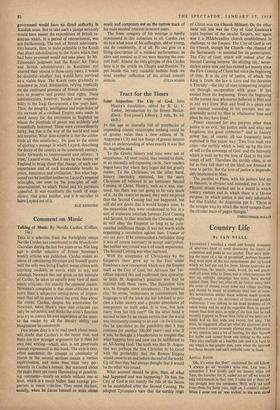Tract for the Times
Saint Augustine: The City of God. John Healey's translation, edited by R. G. V. Tasker, introduction by Sir Ernest Barker. (Dent : Everyman's Library, 2 vols., 8s. 6d. each.) IN this age so dismally full of prophecies of impending cosmic catastrophe nothing could be of greater value than a new edition of St. Augustine's City and few things of greater interest than an understanding of what exactly it was that St. Augustine said.
To the Greeks history and time were not of importance. All went round, they tended to think, in an eternally self-repeating circle. New readers began here, but where they began did not greatly matter. To the Christians, on the other hand, history inevitably mattered, but the early Christians all believed in an imminent Second Coming of Christ. History, such as it was, mat- tered, but there was not going to be• very much of it. As the centuries passed, they were surprised that the Second Coming had not happened, but still did not doubt that it would happen soon. In the meanwhile they were condemned to live in a sort of irrelevant interlude between First Coming and Second. In that interlude the Christian might as well obey the Emperor so long as he com- manded indifferent things. It was not worth while organising a revolution against him. Utamur et nos sua pace. If he commanded a forbidden thing it was of course necessary to accept martyrdom. But neither way round was it of much importance. The Second Coming was what mattered.
With the acceptance of Christianity by the Emperors there grew up in the East under Eusebius a new conception which saw the Empire itself as the City of God, but Africans like Ter- tullian rejected this and reaffirmed their apocalyp- tic faith. St. Augustine's greatness was that he rejected both these views. The Byzantine view was, he thought, mere sycophancy. 'The imperial city,' he wrote, 'endeavours to communicate her language to all the lands she has subdued to pro- cure a fuller society and a greater abundance of interpreters on both sides. It is true, but how many lives has this cost?' On the other hand it seemed to him by no means certain that the world was imminently coming to an end—in De Civitate Dei he speculates on the possibility that it may continue for another 500,000 years—and even if it was, he thought it blasphemous to imagine that what happens here and now can be indifferent to an All-Seeing God. The truth was that St. Augus- tine was perhaps the first Christian to be faced with the probability that the Roman Empire would come to an end before the end of the world. 'Up till then they had always thought that it would be the other way round.
What account should he give, then, of what had happened and was happening? TO him the City of God is not merely the rule of the Saints to be established after the Second Coming. He adopted Tyrconius's view that the earthly reign
of Christ was the Church Militant. On the other hand still less was the City of God Eusebius's tepid baptism of the secular Empire, nor again was it a Hildebrandine church establishment in challenge to the Empire. The City of God is not the Church, though the Church—the channel of the Sacraments—is essential for its preservation. The City of God, which will indeed after the Second Coming become 'the abiding city,' never- theless exists now and has existed not merely since the First Coming of Christ but since the beginning of time. It is the city of justice, of which 'the King is Truth, the law is Love and the duration is Eternity'—the city of men conquering original sin through co-operation with grace. It has existed from the beginning. 'From the beginning of the human race whosoever believed in Him and in any way knew Him and lived in a pious and just manner according to his precepts was un- doubtedly saved by Him in whatsoever time and place he may have lived.'
Power exercised for any purpose other than justice is an evil. 'Set justice aside and what are kingdoms but great robberies?' and in history power has, of course, all too frequently been exercised in this unjust way. 'Two lives built two cities—the earthly which is built up by the love of self to the contempt of God, and the heavenly which is built up by the love of God to the con- tempt of self.' Therefore the earthly cities, in so far as they fall short of the ideal, are doomed in time to perish. But the love of justice is imperish- ably implanted in Man.
The parallel to Plato, with his pattern laid up in Heaven, is obvious and intended, but it is the Platonic dream worked out in a world in which history matters and in which there is a Divine purpose, in which justice is not only admirable but also fruitful. As Augustine put it : 'Christ is the straight way by which the mind escapes from the circular maze of pagan thought.'
CHRISTOPHER HOLLIS






























 Previous page
Previous page